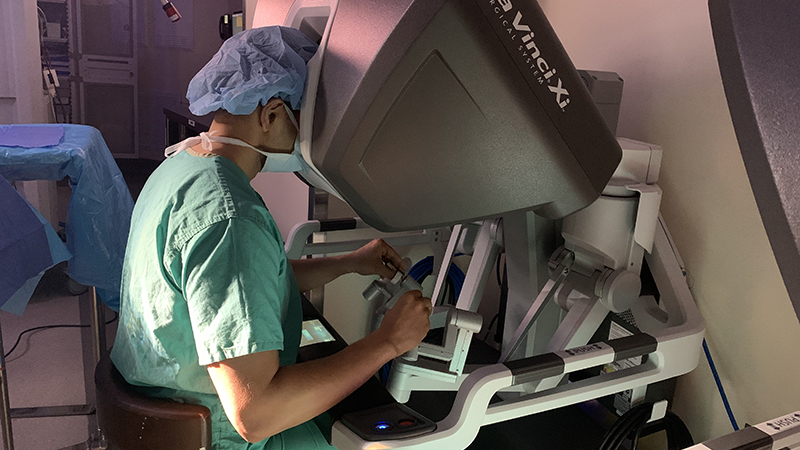How Artificial Intelligence Is Saving the Lives of People With Heart Failure
Early Detection Means Early Treatment
Published February 2023
You've never seen a cardiologist. You've never had any concerning heart symptoms. But one day you get a call: You have heart failure, and with an early diagnosis, you can start treatment that saves your life.
You may think heart failure means that the heart has stopped or is about to stop. However, heart failure means that the heart is not pumping blood through the body as well as it should. Roughly 6.2 million adults in the U.S. are living with heart failure, but the symptoms of heart failure can be hard to identify, even during regular appointments like your annual wellness visit.
Symptoms of heart failure:
- Difficulty breathing
- Fatigue
- Congestion in the lungs (heart failure is sometimes called congestive heart failure)
- Swelling of the legs and feet
- Loss of appetite
- Bloating
Catching heart failure in its early stages is crucial for better outcomes because treatment is more effective and there are more treatment options. However, heart failure is often underdiagnosed or misdiagnosed because it shares symptoms with other conditions such as respiratory diseases, like shortness of breath.
Artificial intelligence (AI) is changing outcomes.
Physician-scientists at Northwestern Medicine are using AI to help identify heart failure in patients with early signs of the disease who need vital heart care — like medication and even heart transplants — says Jane E. Wilcox, MD. AI enhances human understanding; it's not designed to be independent or mimic human intelligence.
Dr. Wilcox is a Northwestern Medicine Bluhm Cardiovascular Institute heart failure and heart transplantation specialist who is leading efforts to use AI to identify heart failure at Northwestern Medicine. "We're meeting you in your community, identifying you as potentially being high risk, and then offering treatment to save your life," she explains.
How AI Identifies Heart Failure
Northwestern Medicine scientists created an algorithm, or a set of instructions given to a computer. They gave the algorithm a list of signs that someone may be at risk of heart failure, such as symptoms they've experienced or their medical history. Then, the algorithm scans Northwestern Medicine health records for patients who fit the parameters that it was given for heart failure risk.
Even if you've been to a Northwestern Medicine location only once — for example, to an immediate care center — this algorithm will look at your health record to see if you have any of the characteristics of someone with heart failure. If you do, it will flag you as potentially being at risk. As a patient, you don't have to do anything.
The algorithm looks at both the "structured data," which are the numbers associated with your health, such as laboratory test results, and "unstructured data," which are the notes your clinician takes during your visit.
If the algorithm identifies you as someone with potential signs of heart failure, a group of clinicians that includes physicians and nurses will meet to review your medical record. If they agree with the algorithm that you are at risk for heart failure, they will reach out to you directly to notify you so you can get the heart care you need.
The clinicians then tell the algorithm if it's flagged someone correctly. The more patients with heart failure that the algorithm identifies, the more accurate it becomes.
So far, the algorithm has identified more than 22,000 patients with possible signs of heart failure.
Clinicians reviewed each case and narrowed the number down to 2,500 patients who they reached out to. As a result, more than 500 patients have gotten treatment for heart failure because of AI. This includes one patient who had no idea that they had heart failure and ended up getting a heart transplant that saved their life.
"We've identified patients who are candidates for heart transplantation and other advanced therapies like clinical trials, and we've gotten them enrolled in these therapies," says Dr. Wilcox. "Northwestern Medicine is currently the only organization in the country using AI to make sure no one with heart failure falls through the cracks."
Innovative Heart Care Close to Home
Patients can get care at Bluhm Cardiovascular Institute Heart Failure Access clinics close to home in the Chicago suburbs, including McHenry County, Lake County and DuPage County. Using an integrated and collaborative approach, heart failure is diagnosed, staged and treated with a wide array of comprehensive therapies and treatments including:
- Medications
- Ventricular assist devices
- Complex heart surgery, including heart transplantation
"AI is not replacing clinicians," says Dr. Wilcox, it helps clinicians provide better care. "Personally, I'd like to get my care at a health system that is wearing suspenders as well as a belt to make sure nothing gets missed."






